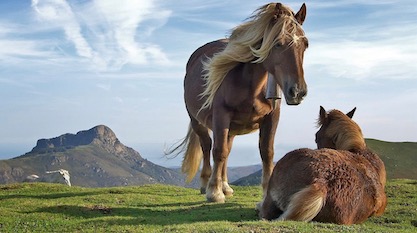 Culture & Ethics
Culture & Ethics
When Horses Sue


Animal rights is not just about being nicer to animals. It is an ideology — to be distinguished from “animal welfare” — that believes fervently in the moral equality between humans and animals. The movement’s goal is to end all human ownership and use of animals for any purpose, perhaps even as pets.
The most potentially potent method of attaining that goal is an advocacy thrust known as “animal standing,” which would open the courts to lawsuits brought by animals.
A Tsunami of Litigation
The animals would be oblivious, of course. The real litigants would be ideologues empowered to harness the raw power of the judiciary to impose their bizarre beliefs into the bedrock of law — threatening all animal industries and enterprises with a tsunami of cases. At the very least, obtaining liability insurance would become impossible and/or cost prohibitive.
Cases have already been brought in this country to allow whales, monkeys, and chimpanzees to sue, with incremental success. A judge in New York’s highest court stated in a non-binding decision that he believed chimps should be declared legal persons, while two federal appeals courts in the Ninth Circuit ruled that animals can have constitutional standing (!!), albeit they didn’t qualify as litigants under the particular statutes in question before the bench. Meanwhile, in Argentina an orangutan was declared a “non-human person” and granted a writ of habeas corpus to be released from a zoo into a primate sanctuary.
Justice the Horse
Now, an attempt in Oregon to have a mistreated horse sue. From the San Francisco Chronicle story:
The horse had been left outside and underfed by his previous owner, who last summer pleaded guilty to criminal neglect. And now Justice [the horse], who today resides with other rescued equines on a quiet wooded farm within view of Oregon’s Cascade mountains, is suing his former owner for negligence. In a lawsuit filed in his new name in a county court, the horse seeks at least $100,000 for veterinary care, as well as damages “for pain and suffering,” to fund a trust that would stay with him no matter who is his caretaker.
Notice that animal-welfare laws properly protected Justice, which — not who — is now safe from further abuse.
Of course the point of the lawsuit isn’t to help Justice, but rather, to destroy the “species barrier” (as some call it) that distinguishes the moral value of humans from that of animals. That would have profound consequences, as a Pepperdine professor notes:
Allowing Justice to sue could mean any animal protected under Oregon’s anti-cruelty statute — a class that includes thousands of pets, zoo animals and even wildlife — could do the same, he said. (Livestock, lab animals, hunting targets, rodeo animals and invertebrates are exempted.) If this approach were adopted elsewhere, Cupp said, a stampede of animal litigation could overrun courts.
“Any case that could lead to billions of animals having the potential to file lawsuits is a shocker in the biggest way,” [Richard] Cupp said. “Once you say a horse or dog or cat can personally sue over being abused, it’s not too big a jump to say, ‘Well, we’re kind of establishing that they’re legal persons with that. And legal persons can’t be eaten.’”
The Time Is Now
The time to thwart animal standing is now, before it comes to fruition. For example, state legislatures and Congress should enact laws making it clear that non-human animals have no standing in courts or enforceable rights in law.
“Animal standing” poses an existential threat to human exceptionalism, rationality, and our economic thriving. Don’t think that “it can never happen here.” Remember, it only takes one judge wanting to make radical history.
Photo credit: Mikel Ortega from Errenteria, Basque Country, Spain, with a retouche by Richard Bartz. See the original file here. [CC BY-SA 2.0 ], via Wikimedia Commons.
Cross-posted at The Corner.
